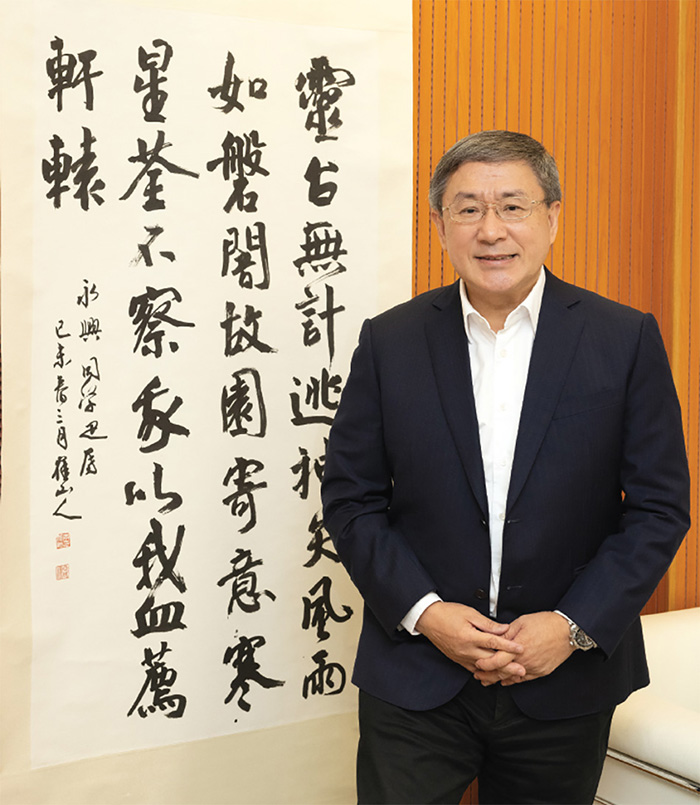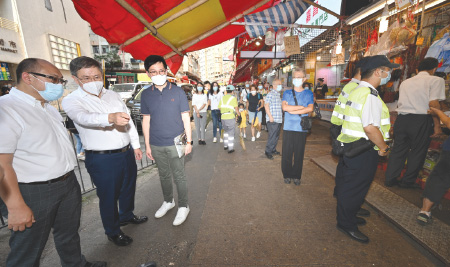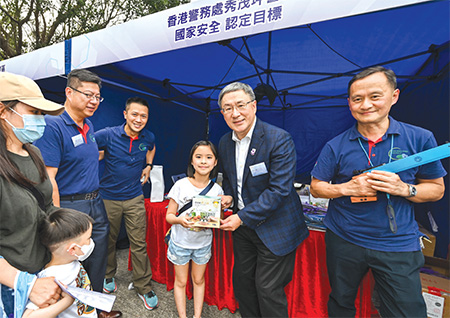

Braving problems with
coordinated and concerted efforts
Enhancing Training and Development for the Civil Service


Civil Service Newsletter Editorial Board

Mr Cheuk said that he was a great fan of TV drama “CID” when he was a student. He shared its advocated values of maintaining law and order and bringing law-flouters to justice. Determined to join the Force, he applied for the post of Police Inspector upon graduation and shunned the idea of working for private companies. He worked in the Special Duties Squad, Patrol Sub-unit, Police Tactical Unit and Emergency Unit before changing track and became an Administrative Officer three years later. “I was born and educated in Hong Kong. I married my wife and started my career here, and I owe everything to this place. Working for the Government after retirement is like running another marathon after finishing one. There is not much pressure and I would do all I can to build and serve Hong Kong. I am deeply honoured for the appointment as the DCS of the core governing team to serve the Country as well as Hong Kong.” said Mr Cheuk.

One important responsibility of the DCS is to assist the Chief Secretary for Administration in supervising and coordinating the work of nine bureaux under his purview, through which the strengths of various B/Ds can be leveraged to address bread-and-butter issues and promote social development. Mr Cheuk has been widely recognised for his work in coordinating district affairs over the past year. “Coordination is not only crucial to improving environmental hygiene, but also significant to our efforts to compete for talents, tell the good stories about our policies, address district problems arising from parallel trade, enhance people’s sense of national identity, etc.,” said Mr Cheuk.

Mr Cheuk remarked that the problem of environmental hygiene hits very close to home and affects the daily life of the public. The emergence of such thorny issues means that old methods do not work, officials should thus rack their brains to tackle them. Sometimes different departments have to take joint actions through the exercise of statutory powers to solve problems. Since the District Matters Co-ordination Task Force was set up last July, Mr Cheuk has been acting swiftly and steering the work of various departments in tackling hygiene blackspots. With a new mindset, various “standard modes of operation” were worked out to rationalise the responsibilities among departments and streamline relevant workflows with a view to resolving long-standing district environmental hygiene issues such as shopfront extension and abandoned vehicles in rear lanes. Government efforts in street cleansing and tackling shopfront extension are generally considered effective, creating a public perception that it is pragmatic and proactive.


Under the proposals on improving governance at the district level, the Government set up the Task Force on District Governance (“TFDG”) while the former District Matters Co-ordination Task Force was revamped as the Working Group on Environmental Hygiene and Cityscape under the TFDG. With a wider range of responsibilities in district matters, the TFDG aims to achieve better coordination and enhance district governance, giving the public a sense of satisfaction and a sense of gain in everyday life and when using government services.

It is of great importance to enhance patriotic sentiments and national identity among the public. Mr Cheuk gives active support to youth marching activities and public education activities on national security. Besides, he coordinates the efforts of the Development Bureau, the Culture, Sports and Tourism Bureau and the Education Bureau in setting up a task force to explore with all sectors ways to preserve and make good use of wartime relics and historical records, with a view to effectively promoting the history of the War of Resistance and fostering people’s sense of national identity.


Moreover, Mr Cheuk has recently assumed the leadership role of the “Policy Promotion Group”. Working closely with the Secretary for Home and Youth Affairs, Director of Chief Executive’s Office, Director of Information Services and relevant B/Ds, the group will devise strategic rollout plans for new policies and initiatives, and lay proper groundwork for policy explanation to win over the public in a systematic manner. “Policy makers can become overconfident, in the conviction that their policies are logical and infallible. A sense of feeling-good may result in overlooking the extent of public doubts and perception. It is the Chief Executive’s design that through this mechanism, policy implementation can be examined in a forward-thinking, objective and comprehensive manner. In this way the Government can better present the justifications for and benefits of the policies so as to improve understanding and garner public acceptance and support.” said Mr Cheuk.

Mr Cheuk pointed out, “When I first assumed office, the media raised concerns about the specific duties of the DCS. No one is asking about that anymore as it can be seen from public information that my portfolio is substantial. I believe that the mission and professional ethics of public officials are to serve the people of Hong Kong and promote their interests. While resolving a problem is fundamental, it is executing the work beautifully that really makes the difference. That is also where public officials derive their professional satisfaction and pride.”
Before the end of the interview, we asked Mr Cheuk how he balances work and life. Mr Cheuk said that he liked living a plain and simple life. “If there are no public activities during holidays, I will go to the Hong Kong-style cafes or cooked food centre that I frequent for breakfast, and then bring takeaway back home for my family and domestic helper. For the remaining time, I will surf the internet, watch TV or videos and read some books to absorb information on sports, travel, food, literature, history, art, current affairs, technology, movies and TV, etc. That is my way of relaxing and getting my peace of mind.”
